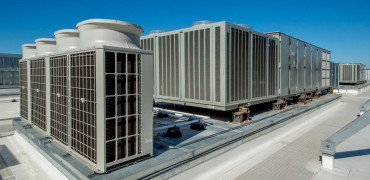In June 2022, the recently-updated Parts L and F of the Building Regulations will come into force.
And while the Regulations focus on higher targets for energy efficiency and ventilation in new buildings, they also carry some important messages for the owners and managers of existing buildings.
The first is that the drive for energy efficiency continues, with a particular focus on big energy users including cooling, ventilation and heating.
The background to this is that the UK must reduce CO2 emissions resulting from our built environment if we are to achieve our Net Zero emissions goal by 2050.
But around 80% of the buildings that will be in use in 2050 are already built, so the efficiency of our existing building is something that we must address.
If that’s not enough of an incentive, then higher energy costs are sure to make building managers look closely at how energy is being used across their portfolio.
Occupant wellbeing can no longer be considered a ‘nice-to-have’ feature
Essential wellbeing
Another message coming out of the updated building regulations is that occupant wellbeing can no longer be considered a ‘nice-to-have’ feature.
The updated Part F for non-dwellings requires CO2 monitoring in offices and other occupied spaces (which are more than 50m2 or under 320m2). The Regulations require that CO2 is measured continuously, to track levels throughout the day and across the seasons.
Ensuring good, continuous air quality is therefore going to be a key deliverable for FM teams. The new Part F states that carbon dioxide monitoring should be regarded as a “broad guide to ventilation”. This means that it’s not simply a case of keeping CO2 levels below a legislated threshold.
Energy use
One of the reasons that Parts L and F are updated simultaneously is that ventilation systems are energy users. It is not enough to design a system for good IAQ, it must also be energy efficient.
The focus is on providing a healthy indoor environment, that is also optimised for efficient performance - and that means keeping up with maintenance of air conditioning and ventilation systems.
At Mitsubishi Electric Service & Maintenance, we believe in taking a ‘teamwork’ approach with our clients to help them balance these requirements, while also maintaining equipment such as chillers which represent a significant capital investment.
The application of technology for remote monitoring, for instance, allows us to monitor equipment and to respond as soon as there is any indication of sub-optimal operation.
Another important point to bear in mind is that given the new building regulations (and other changes such as new minimums for Energy Performance Certificates) some building owners may consider upgrading their air conditioning and ventilation systems in 2022.
That may be a good option for older systems. However, our experience at Mitsubishi Electric is that this can be a disruptive option – and has significant cost implications.
Good advice and planning
Our approach is to discuss the option of an upgrade very carefully with clients. Sometimes, it’s simply not practical to change the entire system.
However, with good advice and planning, we can help to prolong the life of an existing chiller, for example.
We can review what is in the building today, and help to plan a maintenance programme that will improve IAQ and energy efficiency – without the immediate need to replace an entire system.
As government sets higher targets for building performance, it’s crucial to work with a team that can help you to make sensible decisions that save money as well as being better for the building and the environment.
At Mitsubishi Electric Service & Maintenance we aim to provide sound advice that will ensure your system works at its best for as long as possible.
Geoff Turton is Head of Service, Maintenance & After Sales Technical




